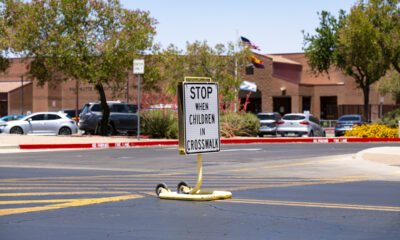colleges
Hobbs Enacts New Law to Prohibit Encampments on State University Campuses

Arizona has enacted new legislation making it illegal to establish encampments for protests or solicitations on state university campuses. This law aims to address concerns over safety and harassment amid recent protests.
Governor Katie Hobbs signed the bill into law on May 7, mandating school officials to order individuals involved in such encampments to dismantle them immediately. Failure to comply can result in arrest for trespassing.
Following the governor’s approval, questions arose regarding the necessity of the measure. Hobbs did not elaborate on her decision, and her office had no immediate comment.
Rep. Alma Hernandez, D-Tucson, sponsored the bill in response to protests that occurred last year, including high-profile demonstrations at Columbia University and events at both the University of Arizona and Arizona State University. Hernandez noted concerns from Jewish students, who felt threatened and avoided certain routes on campus.
Law enforcement intervened during the Arizona protests, using tear gas and pepper balls in Tucson. Interestingly, no representatives from the state universities or the Arizona Board of Regents supported the legislation during legislative discussions.
Support for the bill did come from some lawmakers, including Sen. John Kavanagh, who argued that protesters appropriated public land, restricting access for other students. He cited instances of anti-Semitic behavior toward Jewish students as a justification for the law.
Opponents of the bill expressed concerns over its broad language, which they believed could lead to disproportionate enforcement against specific groups. Sen. Lauren Kuby, for example, emphasized the importance of maintaining public universities as platforms for open dialogue and dissent.
Existing laws already empower universities to regulate demonstrations, allowing them to impose viewpoint-neutral restrictions as necessary for institutional interests.
In addition to criminalizing encampments, the new law compels universities to take disciplinary action against students who refuse to vacate designated protest areas.
Rep. Anna Abeytia voiced her opposition, arguing that the legislation undermines the rights of activists. She highlighted the historical significance of sit-ins in Chicano culture, while other lawmakers questioned potential implications for free speech.
Critics, including Rep. Quanta Crews, expressed fears that the law might be misused to suppress legitimate protests by non-threatening groups. Concerns about ambiguity in the legislation, particularly the prohibition on prolonged use of items like tents, were also raised.
Sen. Analise Ortiz labeled the wording as unconstitutionally vague, suggesting it could inadvertently affect various civic activities. Rep. Alexander Kolodin pointed out that the law could disproportionately target organizations depending on their political affiliations.
Despite the contentious debate, Hernandez defended the bill, citing instances where protestors at the University of Arizona created substantial disturbances without plans to leave.


















